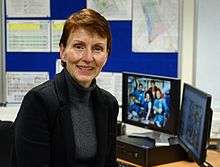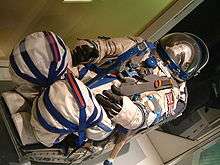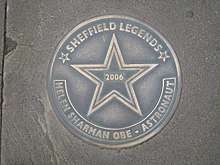Helen Sharman
Helen Patricia Sharman, CMG, OBE, HonFRSC (born 30 May 1963) is a chemist who became the first British astronaut (and in particular, the first British cosmonaut) as well as the first woman to visit the Mir space station in May 1991.
Helen Sharman | |
|---|---|
 Helen Sharman | |
| Born | 30 May 1963 Sheffield, West Riding of Yorkshire, England |
| Nationality | British |
| Alma mater | University of Sheffield, BSc 1984 Birkbeck, University of London, Ph.D. 1987 |
| Occupation | Chemist |
| Space career | |
| Project Juno astronaut | |
Time in space | 7d 21h 13m |
| Selection | 1989 Juno |
| Missions | Soyuz TM-12, Soyuz TM-11 |
Mission insignia | |
Early life and education
Sharman was born in Grenoside, Sheffield, where she attended Grenoside Junior and Infant School, later moving to Greenhill. After studying at Jordanthorpe Comprehensive, she obtained a BSc degree in chemistry at the University of Sheffield in 1984 and a PhD degree from Birkbeck, University of London in 1987. She worked as a research and development technologist for GEC in London and later as a chemist for Mars dealing with flavourant properties of chocolate.[1][2] This later led the UK press to label her the "Girl from The Mars".[3]
Project Juno
After responding to a radio advertisement asking for applicants to be the first British space explorer, Helen Sharman was selected for the mission live on ITV, on 25 November 1989, ahead of nearly 13,000 other applicants.[2][4] The programme was known as Project Juno and was a cooperative Soviet Union–British mission co-sponsored by a group of British companies.[5]

Sharman was selected in a process that gave weight to scientific, educational and aerospace backgrounds as well as the ability to learn a foreign language.[6]
Before flying, Sharman spent 18 months in intensive flight training in Star City. The Project Juno consortium failed to raise the monies expected, and the programme was almost cancelled. With a view towards the flight's impact on international relations, the project proceeded under Soviet expense although as a cost-saving measure, less expensive experiments were substituted for those in the original plans.[7]
The Soyuz TM-12 mission, which included Soviet cosmonauts Anatoly Artsebarsky and Sergei Krikalev, launched on 18 May 1991[8] and lasted eight days, most of that time spent at the Mir space station. Sharman's tasks included medical and agricultural tests,[9] photographing the British Isles, and participating in a licensed[10] amateur radio hookup with British schoolchildren. She landed aboard Soyuz TM-11 on 26 May 1991, along with Viktor Afanasyev and Musa Manarov.
Sharman was 27 years and 11 months old when she went into space, making her (as of 2017) the sixth youngest of the 556[11] individuals who have flown in space. Sharman has not returned to space, although she was one of three British candidates in the 1992 European Space Agency astronaut selection process and was on the shortlist of 25 applicants in 1998.[12]
Since Juno was not an ESA mission, Tim Peake became the first ESA British astronaut more than 20 years later.
For her Project Juno accomplishments, Sharman received a star on the Sheffield Walk of Fame.[13]
Later career
Sharman spent the eight years following her mission to Mir self-employed, communicating science to the public.[1] Her autobiography, Seize the Moment, was published in 1993.[14] In 1997 she published a children's book, The Space Place.[15] She has presented radio and television programmes including for BBC Schools.[16]
By 2011, she was working at the National Physical Laboratory as Group Leader of the Surface and Nanoanalysis Group.[1] Sharman became Operations Manager for the Department of Chemistry at Imperial College London in 2015.[17] She continues outreach activities related to chemistry and her spaceflight, and in 2015 was awarded an Honorary Fellowship from the British Science Association.[18]
In August 2016, Sharman appeared as herself in an episode of the Channel 4 soap opera Hollyoaks.[19]
In January 2020, Sharman said in an interview that "aliens exist, there's no two ways about it" but that "it's possible ... we simply can't see them", a reference to the idea of a shadow biosphere.[20][21][22][23]
Awards and honours

Helen Sharman was awarded the bronze and silver and gold Medal of the Royal Aero Club, in 1990. Then, in 1991, she was chosen to light the flame at the 1991 Summer Universiade, held in Sheffield. On live international television, she tripped while running through the infield of Don Valley Stadium, sending the burning embers onto the track. Encouraged to continue her run, without any flame from the torch, she proceeded round the track and climbed to the ceremonial flame. Despite the lack of any fire from the torch the ceremonial flame still ignited.[24]
For her determined pioneering efforts, Sharman was appointed an Officer of the Order of the British Empire (OBE) in the 1992 Birthday Honours, and the following year an Honorary Fellow of the Royal Society of Chemistry (HonFRSC).[25] Sharman was appointed a Companion of the Order of St Michael and St George (CMG) in the 2018 New Year Honours for services to Science and Technology Outreach.[26]
On 26 May 1991, by Decree of the President of the USSR No. UP-2010, Helen was awarded the "Order of Friendship of Peoples". On 12 April 2011, by Decree of the President of the Russian Federation No. 437, she was awarded the medal "For Merit in Space Exploration".
The British School in Assen, Netherlands is named the Helen Sharman School after her. In addition there is a house named after her at Wallington High School for Girls, a grammar school in the London Borough of Sutton, where each house is named after a high achieving and influential woman. The science block of Bullers Wood school, Chislehurst, Kent was opened by Sharman in 1994 and is called Sharman House.
There is also a house named after her at Rugby High School for Girls a girls' grammar school where houses are named after four influential women,[27] and a Sharman house at Moorlands School, Leeds, where houses are named after inspiring people from Yorkshire. Additionally, a residential development in Stafford in the West Midlands of England has a street named Helen Sharman Drive in her honour. and more recently a block of student flats in Sheffield bear her name.[28]
She has received a number of honorary degrees from UK universities, including:
| Year | Honour | University | Reference |
|---|---|---|---|
| 1991 | Honorary Fellow | Sheffield Hallam University | [29] |
| 1995 | Honorary Doctor of Science degree | University of Kent | [30] |
| 1996 | Honorary Doctor of Technology degree | University of Plymouth | [31] |
| 1997 | Honorary Doctor of Science degree | Southampton Solent University | [32] |
| 1998 | Honorary Doctor of Science degree | Staffordshire University | [33] |
| 1999 | Honorary Doctor of Science degree | University of Exeter | [34] |
| 2010 | Honorary Doctor of Science degree | Brunel University London | [35] |
| 2017 | Honorary Doctor of Science degree | Kingston University | [36] |
| 2017 | Honorary Doctor of Science degree | University of Hull | [37] |
| 2017 | Honorary Doctor of Science degree | University of Sheffield | [38] |
| 2018 | Honorary Doctor of Health Sciences degree | York St John University | [39] |
Bibliography
- Bums on Seats: How to Publicise Your Show (A & C Black, 1992. ISBN 978-0713636628)
- Seize the Moment: Autobiography of Britain's First Astronaut, autobiography, with Christopher Priest and a foreword by Arthur C. Clarke (London : Gollancz, 1993 – ISBN 0-575-05819-6
- The Space Place (Making Sense of Science), children's book, illustrated by Mic Rolph (Portland Press, 1997. ISBN 1-85578-092-5)
References
- "bbk: Birkbeck's Magazine, Issue 29, SPRING 2011" (PDF). Birkbeck University. p. 16. Retrieved 21 September 2015.
- "Helen Sharman, Made in Sheffield". Made in Sheffield Dot Com. Archived from the original on 14 August 2006. Retrieved 20 September 2006.
- Dubbs, Chris; Paat-Dahlstrom, Emeline (2011). Realizing Tomorrow: The Path to Private Spaceflight. U of Nebraska Press. p. 96.
- "Soviets Launch 1st Briton Into Space on Dream Flight". Arizona Republic. Phoenix, Arizona. 19 May 1991. p. A16 – via Newspapers.com.
- "On This Day 1991: Sharman becomes first Briton in space". BBC. Retrieved 18 May 2016.
- "Brits In Space". Chicago Tribune. 30 May 1990. Retrieved 21 September 2015.
- p. 8 in Eric Seedhouse (2014). Tourists in Space. A Practical Guide. Springer. ISBN 978-3-319-05037-9.
- "Sharman becomes first Briton in space". The BBC. Retrieved 21 September 2015.
- "Helen Sharman becomes the first Briton in space". BT Group. Retrieved 21 September 2015.
- Children's Britannica Yearbook 1992. Encyclopaedia Britannica Inc. p. 42. ISBN 0-85229-236-8.
- "Astronaut/Cosmonaut Statistics". www.worldspaceflight.com.
- Klimek, Chris. "Twenty-Five Years Ago, Helen Sharman Traveled to Space as a Private Citizen". Air & Space Magazine. Retrieved 1 January 2020.
- "Sheffield Legends". Sheffield City Council. Archived from the original on 4 March 2016. Retrieved 18 May 2016.
- Sharman, Helen (28 October 1993). Seize the Moment: The Autobiography of Britain's First Astronaut: Autobiography of Helen Sharman. Victor Gollancz. ISBN 0575056282.
- Sharman, Helen (12 March 1997). The Space Place. Portland Press. ISBN 1855780925.
- "Helen Patricia Sharman OBE - 2010". Brunel University. Retrieved 21 September 2015.
- "Former astronaut Dr Helen Sharman finds a new space at Imperial". Imperial College London. Retrieved 6 October 2015.
- "Public engagement and media big hitters honoured by British Science Association". British Science Association. Retrieved 21 September 2015.
- Lindsay, Duncan (2 August 2016). "Hollyoaks spoilers: Alfie Nightingale and Jade Albright plan to lose their virginity". metro.co.uk. Retrieved 30 August 2016.
- Segalov, Michael (5 January 2020). "Helen Sharman: 'There's no greater beauty than seeing the Earth from up high'". The Guardian. Retrieved 28 May 2020.
- Binding, Lucia (6 January 2020). "Aliens exist and could already be on earth, first British astronaut says". Sky News. Retrieved 6 January 2020.
- "Helen Sharman: 'Aliens exist and could be here on Earth'". BBC. 6 January 2020. Retrieved 6 January 2020.
- "Aliens exist but we may simply not see them, says first British astronaut into space". The Telegraph. 6 January 2020. Retrieved 6 January 2020.
- "Baton charge duty for Becks". The Guardian Online. 25 July 2002. Retrieved 4 September 2012.
- "Our Honorary Fellows". Royal Society of Chemistry. Retrieved 30 December 2017.
- "No. 62150". The London Gazette (Supplement). 30 December 2017. p. N4.
- "Rugby High School prospectus". Retrieved 20 January 2019.
- "Sharman Court".
- "Honorary Awards". Sheffield Hallam University. Retrieved 8 September 2015.
- "Honorary graduates 1990-99". University of Kent. Retrieved 8 September 2015.
- "Honorary Degrees". Times Higher Education Online. 19 January 1996. Retrieved 8 September 2015.
- "Honorary Graduates". Southampton Solent University. Retrieved 8 September 2015.
- "Recipients of Honorary Awards". Staffordshire University. Retrieved 8 September 2015.
- "Honorary Graduates of the University". University of Exeter. Retrieved 8 September 2015.
- "Helen Patricia Sharman OBE - 2010". Brunel University London. 28 April 2011. Retrieved 8 September 2015.
- "First British astronaut Helen Sharman named Honorary Doctor of Science by Kingston University". Kingston University. 24 January 2017. Retrieved 6 October 2017.
- "Helen Sharman Awarded Honorary Degree by Hull University". University of Hull. 12 July 2017. Retrieved 25 February 2018.
- "Former astronaut and first Briton in space honoured by the University of Sheffield". University of Sheffield. Retrieved 18 April 2018.
- "York St John University announces 2018 honorary graduates". York St John University. Retrieved 3 October 2018.
External links
| Wikiquote has quotations related to: Helen Sharman |
- Helen Sharman's official website
- 'Life in Space' A Masterclass for children by Helen Sharman Freeview Video by the Vega Science Trust
- Spacefacts biography of Helen Sharman
- BSN – The Helen Sharman School, Assen